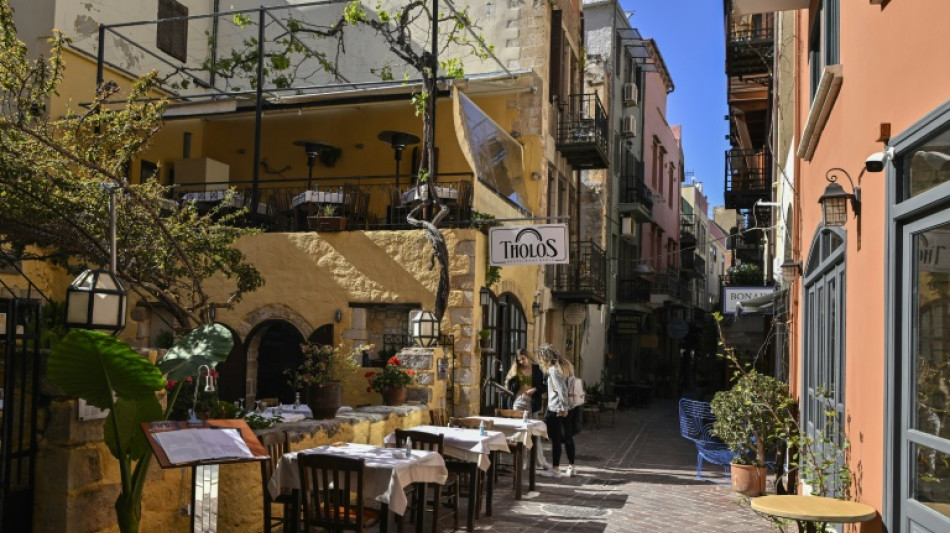

Calling cooks and cleaners: Greece tourism hit by staff shortages
Chryssa Vertakis's three-star Crete hotel is nearly booked up this summer, but her guests will have to eat elsewhere because her kitchen has no chef, and no cooks.
Like hotel owners across the country, she's facing acute staff shortages after two years of pandemic restrictions that have seen droves of hospitality workers seek work elsewhere.
The key industry -- which provides a quarter of Greece's national income -- relies largely on foreign staff to work as waiters, cleaners, busboys and cooks.
Many Bulgarians working as cleaners in Vertakis's hotel Alexia Beach went home during last year's lockdown, and did not return, she told AFP.
Greeks have also sought jobs in other sectors in response to Covid-shortened seasons that compounded long-existing grievances over working hours and low pay.
"Seasonal employees cannot support their families on three and four months of work (per year)," Nikos Kokolakis, chairman of hotel workers in Crete's capital Iraklio, told state TV ERT on Wednesday.
The union of Greek restaurant workers also says it's no surprise eligible workers steer clear of an industry where some operators "demand 10 to 12 hours of work without a day off, offering barely 700 euros ($740) per month."
- 'Quality tourism in danger' -
Andreas Andreadis, honorary chairman of the association of Greek tourism enterprises (SETE), has warned that Greece's travel industry is currently short of over 50,000 mainly kitchen and service staff.
"Our quality tourism is in danger," he tweeted earlier this month.
The shortage threatens to stymie a positive start to the season, helped along by Greece's decision to open up in March, two months earlier than in 2021.
In a bid to further boost visitor numbers, the government in February scrapped mandatory screening tests for travellers who hold a European vaccination certificate.
And vaccine passes will no longer be required in restaurants, bars and shops from May 1, while mandatory masks indoors will be scrapped from June 1.
Vertakis said the loosening of restrictions had raised hopes in the industry of a return to 2019 levels, when 33 million tourists had visited.
"But without staff to accommodate this many people, it will be a problem," she said.
Nektarios Seremetis, who manages the restaurants and bars at the four-star Thalassa Beach Resort down the same coast, is three waiters short.
"Those who worked for us in 2019 left and found jobs in Cyprus or Italy, where salaries are higher," he said.
Tourism Minister Vassilis Kikilias last month suggested some of these vacancies could be filled from among the over 22,000 refugees from Ukraine who have fled to Greece since Russia's invasion in February.
Seremetis is not opposed to the idea, provided the refugees can speak English.
But few Ukrainians have so far travelled to Crete, he said.
- 'We can't do better' -
The war has also dented tourist numbers to Greece.
The conflict has meant the loss of some 600,000 Russians and 240,000 Ukrainians who have cancelled reservations, Lyssandros Tsilidis, head of the Federation of Travel Agencies of Greece, told AFP earlier this month.
At the Chryssi Akti hotel in Crete, Alexandros Pantelakakis has mostly resigned himself to minding the parasols and lounge chairs on his own this season.
Pantelakakis said many Greeks, including the man normally helping him out on the beach, did not receive enough state support to cope through two pandemic-shortened work seasons.
"They hadn't made enough social insurance payments these past two years to earn unemployment benefits," Pantelakakis said.
"So when the tourism season (in 2020 and 2021) was cut short by the pandemic, many had to find jobs elsewhere," he said.
Prime Minister Kyriakos Mitsotakis last week announced a 50-euro increase to the monthly minimum wage from May 1, to 713 euros.
Pantelakakis dismisses this as a "drop in the ocean" given the rise in the cost of living.
Inflation in Greece is around eight percent, according to EU data agency Eurostat.
That doesn't make things easy for employers either, says Alexia Beach owner.
"Energy and food costs are up. Salaries on offer are low, but we can't do better, our operating costs are up 15 percent this year," she said.
A.Uggeri--IM




